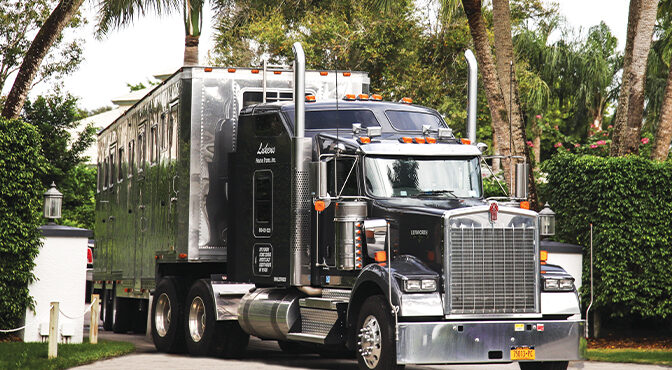Year-round residents of Wellington may not get the seasonal changes that many non-Floridians are used to. Here, fall is not ushered in by chilling temperatures and changing leaves, but rather by an increase in the sighting of the large horse trucks that begin to shuttle competition horses from all over the country down I-95 and Florida’s Turnpike to the “Winter Equestrian Capital of the World.” Conversely, spring has sprung when the horses are headed back in the directions from whence they came.
Many of the trucks that are a part of this bi-annual migration are members of the National Horse Carriers Association (NHCA). This organization is committed to making sure that horses are transported with safety, care and honest business practices. Although sometimes largely overlooked, these members and their staff are the unsung work horses of the equine industry and the wheels that make the Wellington horse world go round.
Although many things have changed in the equestrian industry, the shipping industry has remained the constant force for all of that progress.
Independent haulers from all across the country formed a loose network of trustworthy businesses with similar business practices. All are concerned with the safety of the animals first and foremost, but also best driving practices, best business practices and shared networking opportunities. This group of like-minded businesses eventually grew to form the NHCA. Formally founded in 1960, the mission of the NHCA has been to encourage and promote high standards in the horse transportation industry. Today, the organization has grown to 37 members throughout the United States and Canada who meet bi-annually and work together to keep the industry moving forward.
Many equestrians take for granted that their horses will get on trucks and get off them in good condition, ready for the next competition. However, many important factors must be taken into consideration when shipping horses, and the following are just a few to be aware of:
• Ensure that the carrier you choose is registered and insured: Make sure that the motor carrier you choose is registered with appropriate state authorities if the shipment is entirely within a state and with federal authorities if the shipment is interstate. All NHCA members are required to follow state and federal registration and insurance laws. All NHCA members also present customers or their agents with a bill of lading that clearly states important trip details.
• Choose a carrier with professional and knowledgeable staff: All NHCA members are also experienced horse people, which makes them especially capable of handling horses while on the road, but also makes for easy communication with the barn managers, trainers and horse owners.
• Know the transportation options that are best for your horse and its personal journey: There is no denying that a two-hour trip and a 24-hour trip on the highway have great differences. Anyone who has been in a car, even just trying to leave Florida, knows that comfort is key for making long journeys tolerable. Make sure that you choose the appropriate stall size for your horses and their journey. A single stall for one horse (and smaller horses), a double stall for a little more room (or for larger horses), or a box stall for the ultimate in free range of movement and overall comfort. Most of the long-distance haulers also have trucks that feature air-ride suspension for added comfort.
• Give them some space: This is one component of over-the-road hauling that private and commercial haulers have in common. Trailers have a much more difficult time stopping than regular cars. Sudden stops are also nearly impossible to achieve, and they can also cause severe destabilizing changes to the horses in the back. The best way to avoid these types of stops is to make sure that when you are passing or merging in front of a trailer, leave at least three car lengths between your car and the trailer. This general rule of thumb also goes for the back end of the trailer. If you can’t see a trailer’s mirrors, they can’t see you.
As in everything else with horses, there are many factors to consider when making a decision that is best for you and your program. Members of the NHCA are always available to speak to potential clients and help make the best decision for which company to use and the best means of transportation.
If you are interested in learning more about best practices of shipping horses, or to see if your carrier is a member of the NHCA, visit www.nationalhorsecarriers.com.
